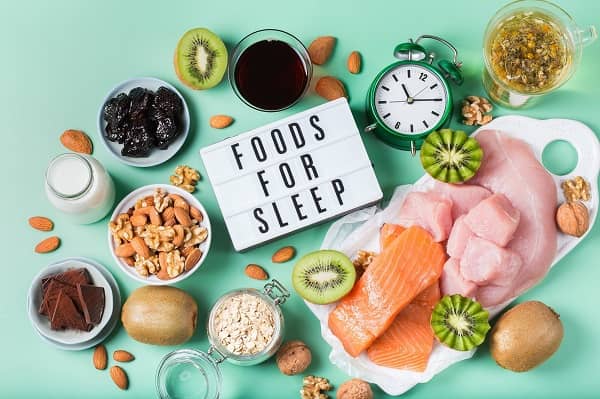Exercise, sleep and diet are the three important pillars for a healthier life and proper diet growth. Sleep and Digestion are interrelated to each other, for both physical and mental health these three pillars should run smoothly. So, in this article, we will discuss how eating habits affect sleep quality and many more.
Interrelationship Between Sleep and digestion
As we already know sleep and digestion are interrelated. The interrelation between sleep and digestion is multifaceted and involves complex physiological processes and intricate signalling pathways within the body. Sleep and digestion are elaborately interrelated processes, regulated by a complex interplay of hormones, neurotransmitters, circadian rhythms, and autonomic nervous system activity. Similarly, if you have poor sleep, it can lead you to get into hormonal imbalance and also can make you crave unhealthy food and hinder your gut’s ability to function properly, causing issues like constipation and heartburn.

Sleep Affects Digestion
1. Hormone Regulation
Sleep deprivation can disturb the production of hormones that regulate hunger and satiety, leptin and ghrelin. Here ghrelin Stimulates appetite and Laptin signals a feeling of fullness. In a similar way when sleep-deprived, leptin levels decrease in the body’s ghrelin levels increase which can lead you to overeat and cause weight gain.
2. Gut Motility
For the digestive system to rest and repair sleep allows. While you are sleeping, the muscles in the digestive tract contract more slowly, allowing for the proper absorption of nutrients and the elimination of waste. So if you have a lack of sleep it can disturb these muscle contractions, leading to constipation, heartburn and indigestion.
3. Gut Microbiome
Did you know that, the gut microbiome is the community of trillions of bacteria that live in our intestines which also plays and vital role in digestion and overall health? Also, sleep deprivation can impact the gut microbiome, which can lead to digestive problems and inflammation.
How do Eating Habits Affect Sleep Quality?
Meal Timing:
If you eat your meals too close to bedtime it can disrupt the body’s natural circadian rhythms, which regulate the sleep-wake cycle and various physiological processes.
Heavy Meal:
Heavy meals or consuming large meals before bedtime can also be the reason for sleep disturbance, and also increase the risk of acid reflux and heartburn, leading to discomfort and disrupted sleep.
Caffeine:
Food and drinks that contain high caffeine such as coffee, tea, energy drinks and chocolate can interfere with sleep by stimulating the central nervous system and can also delay the onset of sleep.

Spicy Food:
Not only drinks, as well as high fat and greasy meals also can increase the risk of acid reflux and gastrointestinal discomfort, making it difficult to fall asleep and stay asleep.
Alcohol:
Alcohol can also disrupt sleep patterns later in the night and lead to fragmented sleep, frequent awakenings and decreased overall sleep quality.
Drinking water:
You can drink plenty of water throughout the day but avoid it as much as possible at bedtime it can also disturb your sleep
Stress:
Both sleep and digestion can be disrupted by stress. So find healthy ways to manage stress, like exercise, yoga and meditation.
Helpful tips for better sleep and digestion:
- For better sleep, focus on consuming plenty of fruits and vegetables. The food that provides the nutrients your body needs for optimal digestion and overall health.
- Avoid large meals before bedtime and allow at least 2-3 hours between your last meal and bedtime.
- Try to eat lighter meals in the evenings to support digestion and prevent discomfort before bedtime.
- Avoid taking greasy or spicy food, especially at night time.
- You should not eat for boredom, stress, or emotional reasons, which can lead to overeating and digestive discomfort.
- Try ancient stress-reduction techniques meditation, deep breathing exercises, and yoga which can also help to reduce anxiety before bedtime.
- Sleep in the comfy mattress and pillow case for better sleep.

Here is the list of the foods that help in better sleep,
Tart Cherry Juice: Tart Cheery juice is a rich source of melatonin, a hormone that helps regulate sleep-wake cycles
Kiwi: Kiwis is a fruit that is a good source of serotonin, a neurotransmitter that helps regulate sleep
Fatty Fish: Fatty fish are rich in omega-3 fatty acids and vitamin D which have been shown to improve sleep quality
Almonds: Almonds contain magnesium, a mineral that helps to relax the muscles and promote sleep.
Warm Milk: Milk contains tryptophan, an amino acid that the body converts into serotonin. So, it has Serotonin is a neurotransmitter that helps regulate sleep. Also, milk has been a traditional bedtime drink for centuries.
Green Tea: For relaxation and better sleep, green tea plays an important role, many herbal teas have teas contain ingredients that have the power of calming and relaxing properties.

FAQs
How does caffeine affect sleep?
Caffeine Affects sleep due to its stimulating properties. It blocks the action of adenosine, a neurotransmitter in the brain that promotes sleep and relaxation. Similarly, when the adenosine receptors are blocked, the activity of the brain increases leading to alertness and wakefulness.
How are Sleep and digestion interrelated?
As we all know there is an interrelationship between sleep and digestion, they are interrelated through the body’s circadian rhythm, impacting hormone regulation and metabolism. In the same way, poor sleep can disrupt digestion, leading to issues like indigestion, acid reflux and altered gut microbiota.
What are the main three pillars for better health?
Nutrition, Exercise and sleep are the main three pillars of better health. These three pillars support overall physical and mental well-being, promoting vitality, resilience and longevity.
